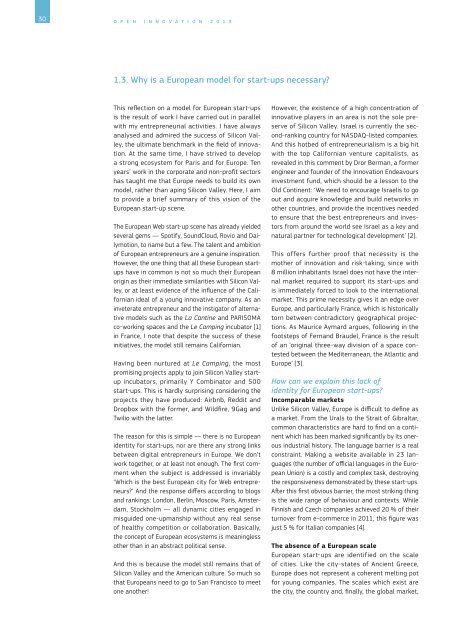Open Innovation 2.0 Yearbook 2013 - European Commission - Europa
Open Innovation 2.0 Yearbook 2013 - European Commission - Europa
Open Innovation 2.0 Yearbook 2013 - European Commission - Europa
You also want an ePaper? Increase the reach of your titles
YUMPU automatically turns print PDFs into web optimized ePapers that Google loves.
30 O P E N I N N O V A T I O N 2 0 1 3<br />
1.3. Why is a <strong>European</strong> model for start-ups necessary?<br />
This reflection on a model for <strong>European</strong> start-ups<br />
is the result of work I have carried out in parallel<br />
with my entrepreneurial activities. I have always<br />
analysed and admired the success of Silicon Valley,<br />
the ultimate benchmark in the field of innovation.<br />
At the same time, I have strived to develop<br />
a strong ecosystem for Paris and for Europe. Ten<br />
years’ work in the corporate and non-profit sectors<br />
has taught me that Europe needs to build its own<br />
model, rather than aping Silicon Valley. Here, I aim<br />
to provide a brief summary of this vision of the<br />
<strong>European</strong> start-up scene.<br />
The <strong>European</strong> Web start-up scene has already yielded<br />
several gems — Spotify, SoundCloud, Rovio and Dailymotion,<br />
to name but a few. The talent and ambition<br />
of <strong>European</strong> entrepreneurs are a genuine inspiration.<br />
However, the one thing that all these <strong>European</strong> startups<br />
have in common is not so much their <strong>European</strong><br />
origin as their immediate similarities with Silicon Valley,<br />
or at least evidence of the influence of the Californian<br />
ideal of a young innovative company. As an<br />
inveterate entrepreneur and the instigator of alternative<br />
models such as the La Cantine and PARISOMA<br />
co-working spaces and the Le Camping incubator [1]<br />
in France, I note that despite the success of these<br />
initiatives, the model still remains Californian.<br />
Having been nurtured at Le Camping, the most<br />
promising projects apply to join Silicon Valley startup<br />
incubators, primarily Y Combinator and 500<br />
start-ups. This is hardly surprising considering the<br />
projects they have produced: Airbnb, Reddit and<br />
Dropbox with the former, and Wildfire, 9Gag and<br />
Twilio with the latter.<br />
The reason for this is simple — there is no <strong>European</strong><br />
identity for start-ups, nor are there any strong links<br />
between digital entrepreneurs in Europe. We don’t<br />
work together, or at least not enough. The first comment<br />
when the subject is addressed is invariably<br />
‘Which is the best <strong>European</strong> city for Web entrepreneurs?’<br />
And the response differs according to blogs<br />
and rankings: London, Berlin, Moscow, Paris, Amsterdam,<br />
Stockholm — all dynamic cities engaged in<br />
misguided one-upmanship without any real sense<br />
of healthy competition or collaboration. Basically,<br />
the concept of <strong>European</strong> ecosystems is meaningless<br />
other than in an abstract political sense.<br />
And this is because the model still remains that of<br />
Silicon Valley and the American culture. So much so<br />
that <strong>European</strong>s need to go to San Francisco to meet<br />
one another!<br />
However, the existence of a high concentration of<br />
innovative players in an area is not the sole preserve<br />
of Silicon Valley. Israel is currently the second-ranking<br />
country for NASDAQ-listed companies.<br />
And this hotbed of entrepreneurialism is a big hit<br />
with the top Californian venture capitalists, as<br />
revealed in this comment by Dror Berman, a former<br />
engineer and founder of the <strong>Innovation</strong> Endeavours<br />
investment fund, which should be a lesson to the<br />
Old Continent: ‘We need to encourage Israelis to go<br />
out and acquire knowledge and build networks in<br />
other countries, and provide the incentives needed<br />
to ensure that the best entrepreneurs and investors<br />
from around the world see Israel as a key and<br />
natural partner for technological development’ [2].<br />
This offers further proof that necessity is the<br />
mother of innovation and risk-taking, since with<br />
8 million inhabitants Israel does not have the internal<br />
market required to support its start-ups and<br />
is immediately forced to look to the international<br />
market. This prime necessity gives it an edge over<br />
Europe, and particularly France, which is historically<br />
torn between contradictory geographical projections.<br />
As Maurice Aymard argues, following in the<br />
footsteps of Fernand Braudel, France is the result<br />
of an ‘original three-way division of a space contested<br />
between the Mediterranean, the Atlantic and<br />
Europe’ [3].<br />
How can we explain this lack of<br />
identity for <strong>European</strong> start-ups?<br />
Incomparable markets<br />
Unlike Silicon Valley, Europe is difficult to define as<br />
a market. From the Urals to the Strait of Gibraltar,<br />
common characteristics are hard to find on a continent<br />
which has been marked significantly by its onerous<br />
industrial history. The language barrier is a real<br />
constraint. Making a website available in 23 languages<br />
(the number of official languages in the <strong>European</strong><br />
Union) is a costly and complex task, destroying<br />
the responsiveness demonstrated by these start-ups.<br />
After this first obvious barrier, the most striking thing<br />
is the wide range of behaviour and contexts. While<br />
Finnish and Czech companies achieved 20 % of their<br />
turnover from e-commerce in 2011, this figure was<br />
just 5 % for Italian companies [4].<br />
The absence of a <strong>European</strong> scale<br />
<strong>European</strong> start-ups are identified on the scale<br />
of cities. Like the city-states of Ancient Greece,<br />
Europe does not represent a coherent melting pot<br />
for young companies. The scales which exist are<br />
the city, the country and, finally, the global market,
















